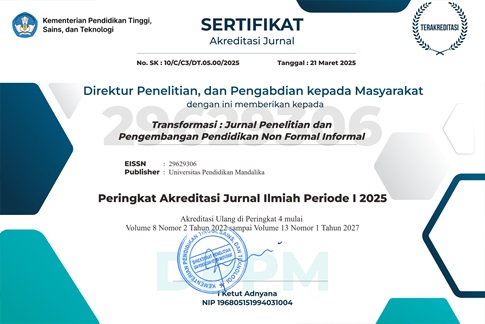Peran Fasilitator Program Pengembangan Kepedulian dan Kepeloporan Pemuda Dalam Mendorong Kemandirian Ekonomi
DOI:
https://doi.org/10.33394/jtni.v11i1.17002Abstract
Abstract: This study aims to analyze the role of facilitators of the Youth Awareness and Pioneering Development Program (PKKP) in increasing the economic independence of youth organizations in Grobogan Regency. The main focus of the research includes strengthening entrepreneurial skills, increasing active participation, and instilling a responsible attitude in the management of community-based economic activities. The method used in this study is qualitative with a case study approach, which involves five informants from the facilitators and members of the Youth Organization. The results of the study show that PKKP facilitators play a strategic role in providing technical assistance, business skills training, and encouraging youth participation and social responsibility in running business units. This role has been proven to encourage the birth of local business initiatives such as fish farming and traditional food processing based on village potential. These findings confirm the importance of the existence of trained and responsive facilitators as the key to the success of the empowerment program. This study recommends strengthening the capacity of facilitators and integrating cross-sectoral programs to encourage youth economic sustainability in villages.
Key Words: Facilitator, Karang Taruna, economic independence, PKKP.
Abstrak: Penelitian ini bertujuan untuk menganalisis peran fasilitator Program Pengembangan Kepedulian dan Kepeloporan (PKKP) Pemuda dalam meningkatkan kemandirian ekonomi pemuda Karang Taruna di Kabupaten Grobogan. Fokus utama penelitian mencakup penguatan keterampilan wirausaha, peningkatan partisipasi aktif, dan penanaman sikap tanggung jawab dalam pengelolaan kegiatan ekonomi berbasis komunitas. Metode yang digunakan dalam penelitian ini adalah kualitatif dengan pendekatan studi kasus, yang melibatkan lima informan dari kalangan fasilitator dan anggota Karang Taruna. Hasil penelitian menunjukkan bahwa fasilitator PKKP berperan strategis dalam memberikan pendampingan teknis, pelatihan keterampilan usaha, serta mendorong partisipasi dan tanggung jawab sosial pemuda dalam menjalankan unit usaha. Peran ini terbukti mendorong lahirnya inisiatif usaha lokal seperti budidaya ikan dan olahan pangan tradisional berbasis potensi desa. Temuan ini menegaskan akan pentingnya keberadaan fasilitator yang terlatih dan responsif terhadap kebutuhan lokal sebagai kunci keberhasilan program pemberdayaan. Penelitian ini merekomendasikan penguatan kapasitas fasilitator dan integrasi program lintas sektor untuk mendorong keberlanjutan ekonomi pemuda di desa.
Kata Kunci: Fasilitator, Karang Taruna, kemandirian ekonomi, PKKP.
References
Almahry, F. F., Sarea, A., Hamdan, A. M., & Mubarak, M. M. S. A. (2021). The impact of entrepreneurship education on entrepreneurs’ skills. In Research Anthology on Business and Technical Education in the Information Era. https://doi.org/10.4018/978-1-7998-5345-9.ch057
Alodwan, S. S., Nser, K., Aboutaleb, A., Alsrehan, H., Alazab, A. M., Alhrahsheh, R., & Al-Khaldi, A. (2024). Empowering youth entrepreneurship for sustainable development: Strategies and insights from the United Arab Emirates. Journal of Infrastructure, Policy and Development, 8(8), 6506. https://doi.org/10.24294/jipd.v8i8.6506
Aziz, K. Ab., Zulkifle, A. M., & Sarhan, M. H. D. L. (2023). Social Entrepreneurship for Sustainable Community Development: Investigating the Determinants for Youths’ Readiness. Journal of System and Management Sciences, 13(1), 444–666. https://doi.org/10.33168/JSMS.2023.0124
Boroushaki, M., Ferguson, M., & Olsen, T. L. (2021). Environmental Sustainability Trade-Offs in a Product’s Supply Chain. In Springer Series in Supply Chain Management (Vol. 10). https://doi.org/10.1007/978-3-030-51957-5_9
Gillan, C., Palmer, C., & Bolderston, A. (2014). Qualitative methodologies and analysis. In Research for the Radiation Therapist: From Question to Culture.
Giwu, O., Ntlanga, S. S., Bontsa, N. V., Mdiya, L., Gwala, L., Makamane, A., & Mdoda, L. (2025). Youth aspirations and participation in agricultural enterprise: a case study in umzimvubu Local Municipality, Eastern Cape province. Cogent Food & Agriculture, 11(1). https://doi.org/10.1080/23311932.2025.2488110
Imanuella, S. F., Idris, A., & Kamaruddin, N. (2025). Social entrepreneurship and rural development in post-independence Indonesia. Social Enterprise Journal, 21(1), 46–66. https://doi.org/10.1108/SEJ-12-2023-0155
Jekamo, G. B., R, D., & Nuri, T. M. (2025). Exploring the Relationship Between Youth Participation in Community Development and Positive Youth Development in Hadiya Zone, Ethiopia: A CB-SEM Analysis. Child and Youth Services, 46(2), 363–399. https://doi.org/10.1080/0145935X.2024.2366199
Keleher, H. (2020). Community development in health. In Community Nursing Practice: Theory, skills and issues. https://doi.org/10.4324/9781003115229-12
Miles, M. B. , & Huberman, A. M. (1994). In Qualitative Data Analysis: An Expanded Sourcebook.
Orellana Orellana, C. P., Orellana Orellana, E. F., Ortiz González, R. A., & Boza Aguirre, J. E. (2024). Management and development of ventures in vulnerable areas: perspective from contingency theory | Emprendimientos en la provincia del Cañar-Ecuador: análisis desde la teorÃa de la contingencia. Revista Venezolana de Gerencia, 29(11 Especia), 137–154. https://doi.org/10.52080/rvgluz.29.e11.8
Pazukhina, S. V., Shalaginova, K. S., & Dekina, E. V. (2021). Social-personal responsibility as the basis for the formation of an at-risk adolescent as a subject of self-development | Социально-личноÑÑ‚Ð½Ð°Ñ Ð¾Ñ‚Ð²ÐµÑ‚ÑтвенноÑÑ‚ÑŒ как оÑнова ÑÑ‚Ð°Ð½Ð¾Ð²Ð»ÐµÐ½Ð¸Ñ Ð¿Ð¾Ð´Ñ€Ð¾Ñтка группы риÑка Ñубъектом ÑаморазвитиÑ. Perspektivy Nauki i Obrazovania, 54(6), 342–362. https://doi.org/10.32744/pse.2021.6.23
Praven Priyaa, V. C., Kiruthika, N., Nivetha, A., Sajimon, P. P., Chandel, P. S., Agrawal, R. K., & Selvakumar, P. (2025). Characteristics of Successful Entrepreneurs. In Strategic Insights and Case Studies on Navigating an Entrepreneurial Landscape. https://doi.org/10.4018/979-8-3693-9261-4.ch005
Qodriyati, T. ’Ulya, Ach. Rasyad, Ach. R., & Supriyono, S. (2024). Entrepreneurship Training For Processing Local Food Based Products For Food Msmes at Grobogan Food Technopark. KOLOKIUM Jurnal Pendidikan Luar Sekolah, 12(2), 403–409. https://doi.org/10.24036/kolokium.v12i2.912
Rappaport, J. (1995). Empowerment meets narrative: Listening to stories and creating settings. American Journal of Community Psychology, 23(5), 795–807. https://doi.org/10.1007/BF02506992
Schiff, D. S., Lee, J., Borenstein, J., & Zegura, E. (2024). The impact of community engagement on undergraduate social responsibility attitudes. Studies in Higher Education, 49(7), 1151–1167. https://doi.org/10.1080/03075079.2023.2260414
Seethalakshmi, R., Navaneethakrishnan, K., Rekha, K. N., & Wundavalli, G. P. K. (2025). Integration of experiential learning and conversational framework in curriculum development – role of 4C’s and student engagement in rural management education. Journal of International Education in Business, 18(1), 65–81. https://doi.org/10.1108/JIEB-06-2023-0038
Downloads
Published
How to Cite
Issue
Section
Citation Check
License
License Term
Â
This work is licensed under a Creative Commons Attribution-ShareAlike 4.0 International License.











